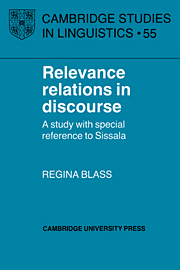Book contents
- Frontmatter
- Contents
- Acknowledgements
- List of abbreviations and symbols
- Maps
- Introduction
- 1 What is discourse?
- 2 Relevance theory and discourse
- 3 The interpretive-use marker rέ
- 4 Constraints on relevance and particle typology
- 5 Baa: truth-conditional or non-truth-conditional particle?
- 6 Defining in Sissala
- 7 Meanings and domains of universal quantification
- 8 Co-ordination and stylistic effects
- Notes
- References
- Index
- Frontmatter
- Contents
- Acknowledgements
- List of abbreviations and symbols
- Maps
- Introduction
- 1 What is discourse?
- 2 Relevance theory and discourse
- 3 The interpretive-use marker rέ
- 4 Constraints on relevance and particle typology
- 5 Baa: truth-conditional or non-truth-conditional particle?
- 6 Defining in Sissala
- 7 Meanings and domains of universal quantification
- 8 Co-ordination and stylistic effects
- Notes
- References
- Index
Summary
The main aim of this book, which developed out of my Ph.D thesis (Blass 1988), is to show how relevance governs discourse.
Although the book makes a contribution to the semantic and pragmatic analysis of a particular unstudied language – Sissala – this is not the only or most important aim of my study. My main intention is to show, using Sperber and Wilson's relevance theory (1986a), that connectivity in discourse is a pragmatic rather than a semantic matter: it results from relevance relations between text and context rather than from relations linguistically encoded in the text.
In the first two chapters, I discuss a variety of approaches to the analysis of discourse, and argue that in the current state of knowledge, relevance theory offers the only possibility of a genuinely explanatory account. In the remainder of the book, I look at a variety of semantic and pragmatic phenomena, and try to show not only that they can be analysed perceptively in terms of relevance theory, but also that their analysis has interesting implications for the theory I have used.
If it is not my main aim to provide a study of some phenomena in Sissala, why did I choose a so-called ‘exotic’, unanalysed, language rather than English or German (my mother tongue) to make my point? The importance of the book lies primarily in what it has to say about pragmatic theory, and in particular in its demonstration that although there may be enormous variation in cultural backgrounds, the principles by which hearers use contextual information in interpreting utterances in discourse are universally the same.
- Type
- Chapter
- Information
- Relevance Relations in DiscourseA Study with Special Reference to Sissala, pp. 1 - 6Publisher: Cambridge University PressPrint publication year: 1990



